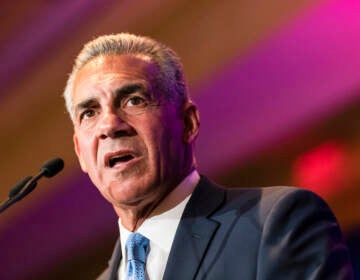New Jersey enacts equal pay law
After years of vetoes by his predecessor, New Jersey Gov. Phil Murphy has signed what he calls the most sweeping pay equity legislation in America.

File photo: New Jersey State Capitol building in Trenton. (Alan Tu/WHYY)
After years of vetoes by his predecessor, New Jersey Gov. Phil Murphy has signed what he calls the most sweeping pay equity legislation in America.
“Closing the wage gap and ensuring that the only consideration — literally the only consideration — for deciding an employee’s pay is the job she was hired to do is not just a matter of fairness, but have no doubt it will also make our economy stronger,” said Murphy.
The Diane Allen Pay Equity Act is named for a former New Jersey state Senator who was a victim of pay discrimination.
“One of my first jobs, I was hired and a man was hired at the same time and he was given almost twice what I was being given,” she recalled. “I asked why and they said, ‘Well he has a family to support.’ Another time, a fellow was given about 50 percent more than me and I had to do his job and mine because he wasn’t capable and that went on for a couple of years.”
The law takes effect on July 1 and requires employers to provide equal pay to all workers for substantially similar work. It allows employees to discuss their compensation with each other without fear of employer retaliation.
Dena Mottola Jaborska with New Jersey Citizen Action said it will be a powerful deterrent against pay discrimination.
“It attempts to make the victims whole by giving them back the lost wages that they didn’t get because they were discriminated against,” she said. “Six years is the maximum time. If you worked somewhere for six years and you can prove all those six years you were discriminated against, you’ll get it all times three because it’s a triple damages award that this law would allow.”
Senate Majority Leader Loretta Weinberg has been trying to get the legislation enacted for the past eight years under former Gov. Chris Christie. She does not believe it will spark a wave of lawsuits against employers.
“Hopefully we have many more employers who have not been guilty of pay inequities,” she said. “But this will help both employers to correct any deficiencies that they might have and employees to make sure that they’re being paid fairly.”
WHYY is your source for fact-based, in-depth journalism and information. As a nonprofit organization, we rely on financial support from readers like you. Please give today.




